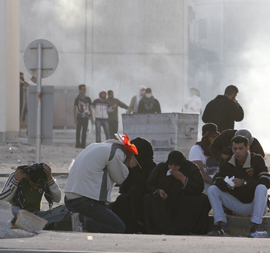Bahrain: UK revokes all export licences to Bahrain
Government ends all export licences with Bahrain after it emerged tear gas canisters used against protesters may have been from stock supplied by UK

A rapid review into the UK export licences to Bahrain, including the provision of tear gas canisters and riot prevention equipment, has resulted in 24 individual and 20 open licences being revoked.
The Minister for the Middle East and North Africa Alistair Burt released this statement: “As a result of the changing situation in Bahrain, we have conducted an immediate and rapid review of UK export licences.
“With advice from the Foreign and Commonwealth Office, the Department of Business, Innovation and Skills, the licensing authority has taken a decision to revoke 24 individual licences and 20 open licences for Bahrain.”
Further attacks on protesters took place on Friday, using the tear gas canisters in conjunction with live round ammunition.
“Bahraini security forces are alleged to have frequently used excessive force, including by firing shotguns and rubber bullets to quell riots.” Amnesty International report, 2011
Over the last year the UK Government has issued similar licences across the Middle East. Channel 4 News found export of tear gas canisters has been approved for other countries in the region and in the last year Libya, Oman, the UAE and Kuwait have all been granted licences. In Friday’s review eight licences were revoked from Libya whilst a review of the wider area is “ongoing”.
Siobhan Kennedy - Business Correspondent
It appears that even the UK government wasn't clear - as recently as last night - how many export licenses it granted to British companies to sell such products as tear gas cartridges, pepper gas and body armour to Bahrain. Initially the Foreign Office spoke of two tear gas licenses here and a number of other licenses there and this morning an official at the FCO stressed to me the overall number was "very small".
Yet just hours later we are cancelling 24 individual (one off) licenses and 20 open (longer term, typically over 5 years) equivalents. So a much bigger clamp down than anyone was led to believe. On top of that, they've also cracked down on Libyan licenses in the same swoop, cancelling 8 individual agreements with the FCO now urgently reviewing export licenses to the wider region.
The reason, says Alistair Burt, minister for the Middle East and North Africa, is because Britain will not tolerate its products being used to "facilitate internal repression".
Some critics, Amnesty International among them, are now arguing, not unconvincingly, that there has been plenty of evidence of internal repression in Bahrain and other Middle Eastern states for years. Activists arrested, roughed up, kept in isolation and worse...so why has the British Government been happily exporting away during this period? Is it only clamping down now because the Sunni ruling elite's activities have been exposed writ large - on a global scale for all to see?
It's a good question and one that will doubtless prove uncomfortable for the FCO over the coming weeks and months.In the UK government's defence it hasn't been completely sitting on its hands. A source at the FCO told me they also revoked three export licenses to Egypt, for similar crowd control products. Though you could argue they kept that quiet - it was never disclosed - precisely for the reasons Amnesty International now points to.
Either way, it seems the question will now be asked why the British government has been knowingly selling arms and anti-riot products to oppressive Middle-Eastern regimes
The Minister insisted that there was no evidence the equipment used in Bahrain was British made and added: “The longstanding British position is clear: We will not issue licences where we judge there is a clear risk that the proposed export might provoke or prolong regional or internal conflicts, or which might be used to facilitate internal repression.”
Despite assurances from the Government that the criteria for granting the licences to Bahrain were met when they were issued, clashes with police are not a new thing in the Gulf state.
Amnesty International produced a report released just a week before the troubles escalated in Bahrain detailing how: “Bahraini security forces are alleged to have frequently used excessive force, including by firing shotguns and rubber bullets to quell riots and demonstrations organized by disenchanted youth in the predominantly Shi’a villages and towns.” Some of the incidents of excessive force date back longer than nine months ago and on numerous occasions since then.